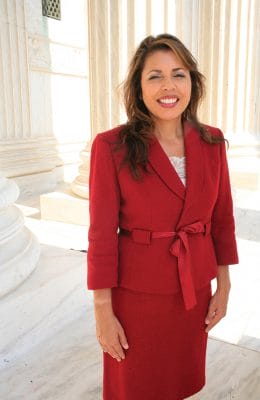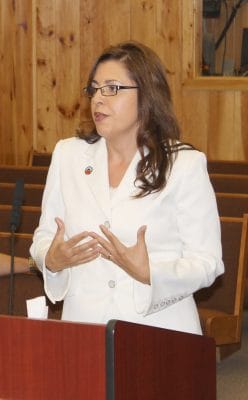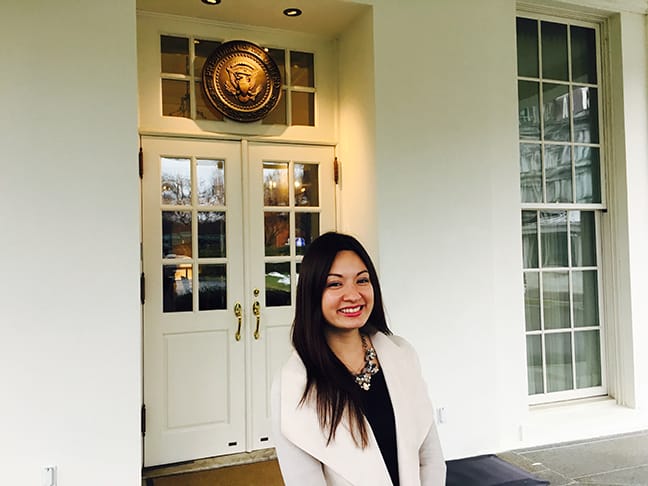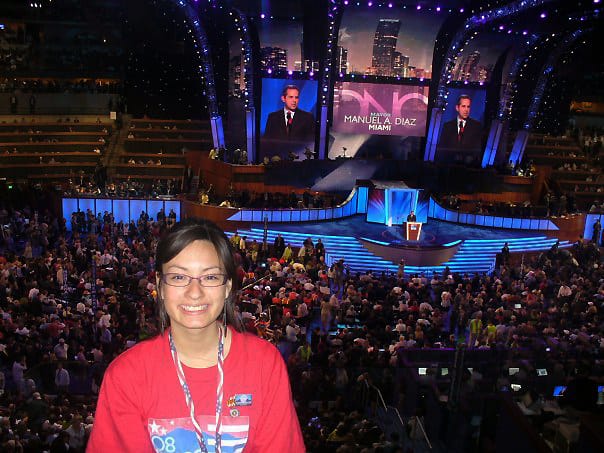Alumna Frances Marquez and the Politics of Mentorship

Frances Marquez’s parents were forced to attend segregated schools because they were of Mexican descent. They were considered inferior to other students.
She never wants that to happen again.
“Equality and equal access are important to me,” said Marquez, a professor of government at Gallaudet University, which serves deaf and hard of hearing students.
The CGU alumna (MA, Politics and Policy, 1995; PhD, Politics and Policy, 2006) has focused her scholarship and activism on issues relevant to Latino and other underrepresented communities. And as a mentor to her students, Marquez has pursued a related mission: getting more deaf people to work in government.
She has succeeded—all the way to the White House.
A former student, Leah Katz-Hernandez, is the receptionist for President Barack Obama, a job she landed thanks to the support of Marquez. Katz-Hernandez is the first deaf person to hold this position in the West Wing, and the relationship between Marquez and Katz-Hernandez is a testament to the value of mentorship and the role it plays in shaping careers and changing lives.
Political Organizer
Politics impacted Marquez’s family early on.
Prior to a 1947 9th US Circuit Court of Appeals decision that ruled “separate but equal” schools for Latinos and whites were unconstitutional, her parents were required to attend segregated schools in Whittier and Pico Rivera, California. At the time, Mexican American children were considered inferior in “their economic outlook, in their clothing, their ability to take part in the activities in school,” according to local school officials.
Marquez parents, Frank and Sally, proved them wrong. In light of the discrimination they had faced, they taught their children to overcome challenges, recognize the value of education, and instilled their children with a sense of social justice.
Marquez and her five siblings went on to earn six college degrees and seven advanced degrees among them. She completed a bachelor’s degree in history from the University of California, Los Angeles, in 1990.
That’s when Marquez’s political and educational career began.

Marquez served as a field organizer for Sen. Diane Feinstein’s race for governor and the Clinton-Gore 1992 and 1996 campaigns. She was a volunteer for Gloria Molina’s campaign for Los Angeles County Supervisor, Hilda Solis’ California Assembly race, and Xavier Becerra’s run for Congress. She served as assistant campaign manager and field director for Nick Pacheco, who served on the Los Angeles City Council from 1999 to 2003.
Marquez was also a labor organizer for the California Schools Employees Association, helping the union win a critical election in Los Angeles.
Over the years, she’s worked as a staffer for several members of Congress such as US Representatives Mike Honda (D-California), Alan Lowenthal (D-California), and Steny Hoyer (D-Maryland). In Honda’s office, Marquez helped advance the Reuniting Families Act and the Strengthen and Unite Communities with Civics Education and English Skills Act, legislation that impacts immigrant communities.
When she started teaching at Gallaudet in 2004, she came to a startling conclusion: She had never met a deaf person working in politics. So she set a goal to get more young, deaf people involved in government.
“A Great Experience”
Marquez encourages her students to sign up for conferences, attend seminars, and seek internships in public office. She writes letters of recommendations, serves as a reference on students’ job applications, and taps her networks of organizers and officials for openings and opportunities.
She also incorporates current events into her courses to engage her students.
During election years, Marquez requires her students to pick a presidential and congressional candidate and track their campaigns.
She took students, including Katz-Hernandez, to the Democratic National Convention in Denver, Colorado, in 2008 to volunteer and help delegates. The event featured high-profile figures such as former President Bill Clinton and Madeline Albright, the first woman to serve as Secretary of State.
At the convention, Marquez “used every possible contact she had to ensure that her students had a great experience, and most importantly—excellent accessibility,” Katz-Hernandez recalled. “We were all deaf and [Marquez] would not accept anything below the professional standards of accessibility.”
Marquez encourages students to get involved in the political process.

“I tell my students, ‘If you want other people making policy for you then you have the status quo,’” Marquez said. ‘“People who don’t know the specifics of your community are making policy for you right now. You are from that community. You can make the policy yourself and educate people about [your community].”
This struck a chord with Katz-Hernandez.
“ROTUS”
When Katz-Hernandez was a first-year student at Gallaudet, she was elected class president. During the 2008 convention, she created a blog called DeafCampaign2008 to keep friends and family up-to-date. It grew into a broader forum for discussing political campaigns, volunteerism, voter registration, and issues pertinent to the deaf community.
Impressed by her work, Marquez would come to write Katz-Hernandez letters of recommendation that enabled her to secure an internship with US Rep. Hoyer and entry to the Washington Center’s Presidential Academic Seminar, a program that immerses students in government circles, among other opportunities.
“Our passions are very similar,” Katz-Hernandez said of Marquez. “We care deeply about engaging historically marginalized communities, especially those with language barriers such as American Sign Language or Spanish-language communities.”
After Katz-Hernandez graduated from Gallaudet with a bachelor’s degree in history in 2010, she kept in contact with her professor. When she decided she wanted to work for President Obama’s reelection campaign in 2012, Marquez supported her and gave critical advice for working on a campaign. Katz-Hernandez secured a full-time job for the Obama for America campaign as a researcher that later led to another full-time job as a disabilities constituency coordinator for Obama’s presidential inaugural committee.

Shortly after the inaugural, Katz-Hernandez—was hired as an assistant in the Office of the First Lady’s press office, part of the Executive Office of the President. She served in that capacity for about two years before she was promoted as the new receptionist of the United States (jokingly referred to as “ROTUS” by President Obama and others) in 2015.
Katz-Hernandez’s duties include welcoming all visitors, managing the White House guest book, and overseeing the Roosevelt Room, a West Wing meeting room. She routinely meets world leaders, public officials, and celebrities—from German Chancellor Angela Merkel to “Humans of New York” photographer Brandon Stanton.
“[Marquez and I] greatly enjoy public service, knowing that every day we wake up and we help the best interests of the community by being present and visible in government,” Katz-Hernandez said.
Impressive Role Model
Katz-Hernandez described Marquez as an “impressive role model.”
“[The] most important thing Dr. Marquez did for me was introduce me to hundreds of other professional Latina women,” she said. “I met lawyers, doctors, Capitol Hill staffers, communication professionals, journalists, pollsters, professors, and many more who were also [Latina]. These women welcomed me like a sister into the community, and it was meaningful to me on a deeper level than professional networking.”
As Marquez sees her, Katz-Hernandez—whose mother is Jewish and father is Latino—is a trailblazer. She is encouraged by her former student’s early accomplishments—Katz-Hernandez is 28—will inspire others “to just jump right in and change the whole culture.”
“I was telling my students,” Marquez added, “‘One day, we will have a deaf member of the House of Representatives or the Senate. Or maybe the White House.’”
To view short news segment on Leah Katz-Hernandez by NewsBeat Social, click on the link below: